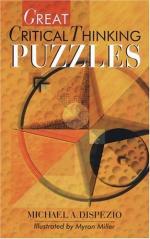|
This section contains 387 words (approx. 2 pages at 300 words per page) |

|
Critical Thinking
Summary: Analyzes an essay by William Golding concerning categories of thinking grades. Describes each of Goldings three thinking grades. Explores how Grade three thinkers form the masses to which our culture aspires, grade two thinkers doubt and bring up grand questions, and grade three thinkers develop and ponder these questions and find the answers we need to know what we require.
According to a system devised by William Golding, there are three categories of thinking grades one, two and three. Many people may think it's hard to categorize some-
thing as complex as thought, but I believe quite the contrary. It's actually easier to categorize more complex subjects such as thought rather than material things.
In grade three thinking Golding explains that people follow their emotions rather
than rational thought. People realize what should be done, and do just the opposite. I found it quite surprising that Golding mentioned this because of how rarly people realize it. I believe that the world today, as a whole, would be considered grade three thinkers, if not for the requirements of prejudice and hypocrisy.
The thinkers of grade two are quite different than grade three, in that people who think on the second level are able to find contradictions but refuse to...
|
This section contains 387 words (approx. 2 pages at 300 words per page) |

|


